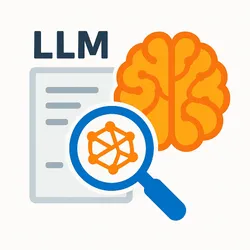LLMScraper
Pricing
Pay per usage
Go to Apify Store
LLMScraper
Find best scraper for your website and data you need.
0.0 (0)
Pricing
Pay per usage
0
3
2
Last modified
2 months ago
🤖 LLM-Powered Web Scraper
An intelligent Apify Actor that uses Claude AI to automatically discover, test, and select the best Apify actors for your web scraping tasks. No manual configuration needed!
✨ Features
- 🧠 AI-Powered Actor Discovery: Uses Claude AI to automatically find and test the best Apify actors for your target website
- 🔄 Smart Retry Logic: Automatically adjusts parameters and retries failed attempts with different actors
- 📊 Quality Assessment: Evaluates scraped data quality across multiple dimensions (completeness, relevance, structure, volume)
- 🎯 Priority-Based Testing: Tests domain-specific actors first, then falls back to general-purpose ones
- 📈 Real-time Progress: Tracks and reports scraping progress with detailed logging
- 🔗 MCP Integration: Connects to Apify MCP Server for dynamic actor discovery and execution
- ⚙️ Flexible Configuration: Extensive customization options for timeout, quality thresholds, and model selection
🚀 Quick Start
- Set up your Claude API key in the Actor input or as an environment variable
- Provide your target URL and describe what data you want to extract
- Run the Actor - it will automatically find and test the best scraping approach
Example Input
📝 Input Configuration
Required Fields
targetUrl: The URL of the website you want to scrapeextractionGoal: Describe what data you want to extract from the websiteclaudeApiKey: Your Anthropic Claude API key for AI-powered analysis
Optional Configuration
maxActorAttempts(default: 10): Maximum number of different actors to trymaxRetriesPerActor(default: 3): Maximum retry attempts per actormaxTimeMinutes(default: 30): Maximum total execution time in minutesmodelName(default: "claude-3-5-haiku-latest"): Claude model to usedebugMode(default: false): Enable detailed loggingpreferSpecificActors(default: true): Prioritize domain-specific actorsminDataQualityScore(default: 70): Minimum quality score (0-100) to accept resultsenableProxy(default: true): Use proxy for scraping requests
Available Claude Models
claude-3-5-haiku-latest- Fast & cost-effective (recommended)claude-3-5-sonnet-latest- Balanced performance and qualityclaude-3-opus-latest- Maximum quality (slower, more expensive)
📊 Output
The Actor saves results to:
Dataset
Each scraped item with metadata:
Key-Value Store
Summary information in SCRAPING_RESULT:
🔧 How It Works
- Actor Discovery: Connects to Apify MCP Server to discover available actors
- AI Analysis: Uses Claude to analyze the target website and select appropriate actors
- Smart Testing: Tests actors in priority order with intelligent parameter adjustment
- Quality Evaluation: Assesses data quality using multiple metrics
- Retry Logic: Automatically retries with different parameters if needed
- Result Selection: Returns the best results based on quality scores
🏗️ Architecture
The Actor consists of several key components:
- MCP Client (
src/llmscraper/mcp/): Handles communication with Apify MCP Server - Claude Manager (
src/llmscraper/claude/): Manages AI conversations and tool calls - LLM Scraper Actor (
src/llmscraper/llm_scraper/): Main orchestration logic - Retry Logic (
src/llmscraper/llm_scraper/retry_logic.py): Intelligent parameter adjustment - Quality Evaluator (
src/llmscraper/llm_scraper/quality_evaluator.py): Data quality assessment
🔑 Environment Variables
ANTHROPIC_API_KEY: Your Anthropic Claude API key (alternative to input field)APIFY_TOKEN: Automatically provided by Apify platformMCP_SERVER_URL: Custom MCP server URL (optional)
⚡ Performance Tips
- Use Haiku Model: For most tasks,
claude-3-5-haiku-latestprovides the best speed/cost ratio - Adjust Attempts: Reduce
maxActorAttemptsfor faster results, increase for better coverage - Quality Threshold: Lower
minDataQualityScoreif you're getting no results - Time Limits: Set appropriate
maxTimeMinutesbased on your needs
🛠️ Development
Local Testing
Project Structure
📚 API Reference
Main Function
Configuration
📄 License
MIT License - see LICENSE file for details.
🆘 Support & Troubleshooting
Common Issues
- API Key Issues: Ensure your Claude API key is valid and has sufficient credits
- No Results Found: Try reducing
minDataQualityScoreor increasingmaxActorAttempts - Timeout Errors: Increase
maxTimeMinutesfor complex websites - Quality Score Too Low: Adjust your
extractionGoalto be more specific
Debugging
- Enable
debugMode: truefor detailed logging - Check the Actor logs for step-by-step execution details
- Verify the target URL is accessible and returns content
- Monitor the progress updates in the key-value store
Performance Optimization
- Use
claude-3-5-haiku-latestfor faster, cost-effective processing - Set appropriate
maxActorAttemptsbased on your time/quality requirements - Enable
preferSpecificActorsto prioritize domain-specific solutions
On this page
Share Actor:


